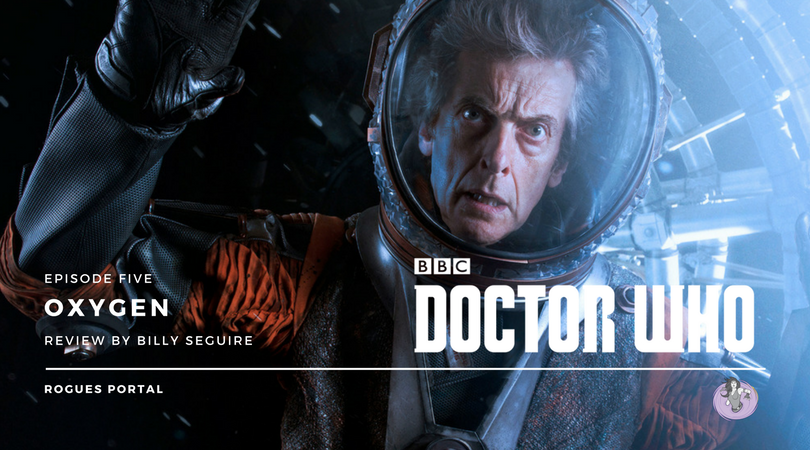
Doctor Who: Oxygen
Written by Jamie Mathieson
Directed by Chris Palmer
Starring Peter Capaldi, Pearl Mackie, Matt Lucas
A review by Billy Seguire
Space. The final frontier. Those iconic words, spoken in Peter Capaldi’s sullen timbre, denounce the intended promise of endless exploration, offering an ominous warning of death in its place. Suffice it to say, Oxygen is an intense episode. Shot in unnervingly dark blacks that evoke the emptiness of space, and employing some impressive standalone visual sequences, it’s a downright gorgeous episode as well. Comparisons to Alien and other space-horror are entirely appropriate, especially with a political message that throws its ire at a system that would allow breathing to become a capitalist enterprise. Oxygen is a triumph in all the best ways, complete with a bleak ending that shakes the foundation of how the character of the Doctor is written as it sets up possibilities for future episodes.
Like all the best episodes of Doctor Who, the strength of Oxygen lies in exploring the Doctor’s flaws as a character. Losing both his TARDIS and sonic screwdriver over the course of the episode, there’s a sense that he’s faltering as the Doctor rushes into a deadly situation headfirst without understanding what’s going on. He isn’t able to think fast enough to keep up and the constant onslaught of that failure nearly costs him everything but a grandiose death. Incredibly, the Doctor actually felt more at home in the classroom this week, lecturing on the dangers of space in a monologue that foreshadowed the way Oxygen would end. This is the Doctor who’s stayed at home for fifty years and isn’t necessarily at the top of his game. He puts people in danger and walks away worse for it. This whole situation was dangerous and it’s his fault.
While the whole situation wasn’t entirely obtuse, I don’t think I would have come to the same conclusions about the Doctor’s character being responsible for the chaos that ensued if it wasn’t for Nardole. Matt Lucas is creating such an interesting character here, transitioned magnificently over the last few episodes from a bumbling comic relief character into a staunch moral authoritarian. He’s so overbearing and protective, actively antagonistic towards the Doctor, that I just absolutely cannot look away. In one of the episode’s best continuity nods, Nardole actually steals a fluid link off the TARDIS in order to prevent the Doctor from leaving Earth, much like the First Doctor in The Daleks. He says things to the Doctor that should make us hate him, and yet, his motivation is to guard the vault and protect the Earth. Looking at how Oxygen ultimately played out, this brand of cold truth may be good for the Doctor in the long term.
The stakes of Oxygen feel real, especially for Bill. The space-zombies, more specifically their A.I. controlled space-suits, give an immediate intensity to the situation that I struggle to find comparisson for. The loneliness of the empty space station, combined with the intercom-led guiding voice of some of the earlier scenes, had a very Dead Space vibe. And I still haven’t gotten over that gorgeous slow-motion sequence, a viscerally first-person experience where the moments tick by before Bill passes out. It was such an interesting, mature way to handle that scene of Bill’s suffocation in the vacuum of space and I hand it off to director Chris Palmer for giving that moment that time it needed to really hit home. There was space between every second as you could see the other characters struggling to figure out how to help. It was a moment that left scars, leaving Bill Oxygen-deprived and the Doctor temporarily blind. The second time Bill is in peril, with space-zombies approaching and the Doctor refusing to tell a joke, was downright cruel. I loved it. The bodies in space-suits have a Cyberman quality to them that intimidates well and makes them feel like a dual threat with the vacuum of space.
And when it ends, it ends sad. Bill is revived, but she’s the only member of the undead crew to get that luxury treatment. Ivan looking at his dead wife after her suit gives him her oxygen is a beautiful moment, much like Bennett looking at O’Donnell’s ghost in Before the Flood. This sort of lasting consequence to an adventure is exactly what I said was missing in the last episode, and I’m glad there’s still a place for genuinely disturbing, dark endings in Doctor Who. There were a few elements left hanging. The A.I. of the suits, Velma in particular, could have been used more effectively, or even brought back around to connect with Gus from Mummy on the Orient Express, but I had so much fun with the surface-level tension of this episode that I can abide a few neglected elements falling by the wayside.
One of the most important lines in Oxygen is “The end-point of capitalism: a bottom line where human life has no value at all.” While this season in particular has felt intentionally political, it’s really nothing new for Doctor Who as a whole. One of my favourite episodes of last series was The Zygon Inversion with its anti-war speech. In many ways, the anti-capitalist message of Oxygen was the same as Thin Ice, but with a darker edge that isn’t cleaned up so easily, only seemingly combatted by “dying well” or making a choice to actively stand against it. I liked the note of where humanity was going to go afterwards, eschewing capitalism in favour of the more Star Trek like future promised by Capaldi’s opening monologue.
When Sleep No More aired during the last series, Mark Gatiss specifically pointed out how it was written as an episode where the Doctor doesn’t win. I’d argue that Oxygen delivered more by letting the Doctor win the battle but not the war. He doesn’t walk away with a swing in his step, but battle-wounded. In one of the most shocking twists, we learn that the treatment performed by Nardole in the TARDIS was ineffective. The Twelfth Doctor is now blind. I expected this to be wrapped up by the end of the episode, an interesting premise that would go mostly unexplored, like so many other good little tidbits we tend to get. But after an initial “cure”, we learn the blindness is permanent. This is fantastic. I genuinely hope the Doctor’s blindness sticks until regeneration. It would be such an important arc for the series to tackle if the Doctor had to carry on saving the universe with such a relatable physical impairment that I don’t want to see this opportunity wasted. It’s the last season for both Moffatt and Capaldi, after all. Better to go out, to die well, with something extra special.
The Verdict
Watch It! It’s been a long time since an episode of Doctor Who felt like it put our heroes in real, physical jeopardy with lasting repercussions. Oxygen is worth experiencing for that sense of endured terror and survival, enriched by foreshadowing elements in the lecture hall and a real sense of development for Nardole. Prior to Oxygen, Jamie Mathieson has given us gems like Mummy on the Orient Express, Flatline, and The Girl Who Died, episodes that have defined the Twelfth Doctor’s era with a deliciously dark sense of drama. With the incredible repercussions of Oxygen’s hanging thread, next week’s episode will definitely not be one to miss.


![[INTERVIEW] WRITER RON CACACE AND ARTIST VINCENT LOVALLO TALK ALL THINGS ‘BITE SIZED ARCHIE’](https://geekd-out.com/wp-content/uploads/2022/05/BiteSizedArchie_Vol1_102-103_Spread-150x150.jpg)
